#SQL Developer
Explore tagged Tumblr posts
Text
THINKWISE DEVELOPERS for #Europe, REMOTE WORK
THINKWISE DEVELOPERS for #EuropeREMOTE WORKContract : 6 MonthWages : 50 EURO Per HrSkill : #DotNet #SQL #thinkwisedevelopers DotNet #dotnetdeveloper #dotnetdevelopment #DotNetDevelopersinEurope europe #europejobs #jobsineurope #itjobsineurope #european #indianineurope #europerecruitment #itrecruitment #itstaffing openfornewopportunities #jobopenings #hirirng #hiringalert #hiringimmediately…
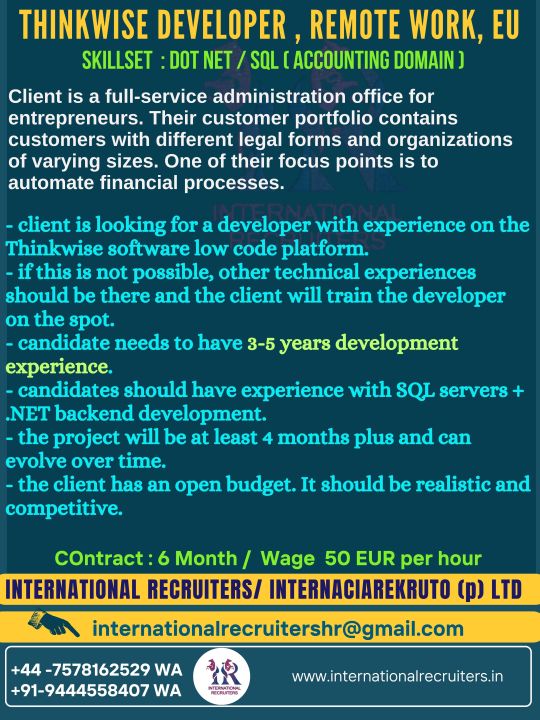
View On WordPress
#Dontnet Developer#Dotnet Development#EuropeITjobs#Europejobs#InternaciaRekruto#Internationalrecruiters#Internationalrecruiterschennai#internationalrecruitersindia#JobsinEurope#Remotejobs#Sql developer#Thinkwise Developer#Workfromhome
0 notes
Text
SQL Developer Skills with Databases
SQL Developer Skills with Databases encompass a range of abilities required to effectively work with databases using Structured Query Language (SQL). These skills include proficiency in writing SQL queries, designing and optimizing database schemas, implementing database security measures, and conducting data analysis. SQL developers should also be well-versed in database management systems (DBMS) such as Oracle, MySQL, or SQL Server. Strong problem-solving and troubleshooting skills are crucial for resolving database-related issues. With these skills, SQL developers can efficiently manipulate and extract data, ensure data integrity, and contribute to the successful development and maintenance of databases for various applications and industries.
Read more:- SQL Developer
0 notes
Text
SQL Fundamentals #1: SQL Data Definition
Last year in college , I had the opportunity to dive deep into SQL. The course was made even more exciting by an amazing instructor . Fast forward to today, and I regularly use SQL in my backend development work with PHP. Today, I felt the need to refresh my SQL knowledge a bit, and that's why I've put together three posts aimed at helping beginners grasp the fundamentals of SQL.
Understanding Relational Databases
Let's Begin with the Basics: What Is a Database?
Simply put, a database is like a digital warehouse where you store large amounts of data. When you work on projects that involve data, you need a place to keep that data organized and accessible, and that's where databases come into play.
Exploring Different Types of Databases
When it comes to databases, there are two primary types to consider: relational and non-relational.
Relational Databases: Structured Like Tables
Think of a relational database as a collection of neatly organized tables, somewhat like rows and columns in an Excel spreadsheet. Each table represents a specific type of information, and these tables are interconnected through shared attributes. It's similar to a well-organized library catalog where you can find books by author, title, or genre.
Key Points:
Tables with rows and columns.
Data is neatly structured, much like a library catalog.
You use a structured query language (SQL) to interact with it.
Ideal for handling structured data with complex relationships.
Non-Relational Databases: Flexibility in Containers
Now, imagine a non-relational database as a collection of flexible containers, more like bins or boxes. Each container holds data, but they don't have to adhere to a fixed format. It's like managing a diverse collection of items in various boxes without strict rules. This flexibility is incredibly useful when dealing with unstructured or rapidly changing data, like social media posts or sensor readings.
Key Points:
Data can be stored in diverse formats.
There's no rigid structure; adaptability is the name of the game.
Non-relational databases (often called NoSQL databases) are commonly used.
Ideal for handling unstructured or dynamic data.
Now, Let's Dive into SQL:

SQL is a :
Data Definition language ( what todays post is all about )
Data Manipulation language
Data Query language
Task: Building and Interacting with a Bookstore Database
Setting Up the Database
Our first step in creating a bookstore database is to establish it. You can achieve this with a straightforward SQL command:
CREATE DATABASE bookstoreDB;
SQL Data Definition
As the name suggests, this step is all about defining your tables. By the end of this phase, your database and the tables within it are created and ready for action.

1 - Introducing the 'Books' Table
A bookstore is all about its collection of books, so our 'bookstoreDB' needs a place to store them. We'll call this place the 'books' table. Here's how you create it:
CREATE TABLE books ( -- Don't worry, we'll fill this in soon! );
Now, each book has its own set of unique details, including titles, authors, genres, publication years, and prices. These details will become the columns in our 'books' table, ensuring that every book can be fully described.
Now that we have the plan, let's create our 'books' table with all these attributes:
CREATE TABLE books ( title VARCHAR(40), author VARCHAR(40), genre VARCHAR(40), publishedYear DATE, price INT(10) );
With this structure in place, our bookstore database is ready to house a world of books.
2 - Making Changes to the Table
Sometimes, you might need to modify a table you've created in your database. Whether it's correcting an error during table creation, renaming the table, or adding/removing columns, these changes are made using the 'ALTER TABLE' command.
For instance, if you want to rename your 'books' table:
ALTER TABLE books RENAME TO books_table;
If you want to add a new column:
ALTER TABLE books ADD COLUMN description VARCHAR(100);
Or, if you need to delete a column:
ALTER TABLE books DROP COLUMN title;
3 - Dropping the Table
Finally, if you ever want to remove a table you've created in your database, you can do so using the 'DROP TABLE' command:
DROP TABLE books;
To keep this post concise, our next post will delve into the second step, which involves data manipulation. Once our bookstore database is up and running with its tables, we'll explore how to modify and enrich it with new information and data. Stay tuned ...
Part2
#code#codeblr#java development company#python#studyblr#progblr#programming#comp sci#web design#web developers#web development#website design#webdev#website#tech#learn to code#sql#sqlserver#sql course#data#datascience#backend
110 notes
·
View notes
Text
Ok turns out if you don’t practice your problem solving skills often there is a 100% chance your brain will regress to the state of your 6 year old self and you will forget how to solve the most basic problems.
Good to know.
#I’m not developing anything so I don’t problem solve often#not aiming to be a dev atm#this was so surprising#codeblr#studyblr#coding#programming#code#java#python#javascript#study blog#self study#learning#productivity#sql#progblr#damn I write long sentences btw
337 notes
·
View notes
Text
Programmers, Web designers, game developers, anyone else who does stuff with numbers on a computer screen.....curious to know if you guys ever dream in code, and if so, do you like it? I for one do not find it to be particularly enjoyable but want to hear what others have to say lol.
#php will be the death of me#web design#programming#coding#game developers#code#computer programming#computers#computer science#html#css#html css#javascript#visualbasic#c#c++#python#software engineering#sql
40 notes
·
View notes
Text
SQL Chart !
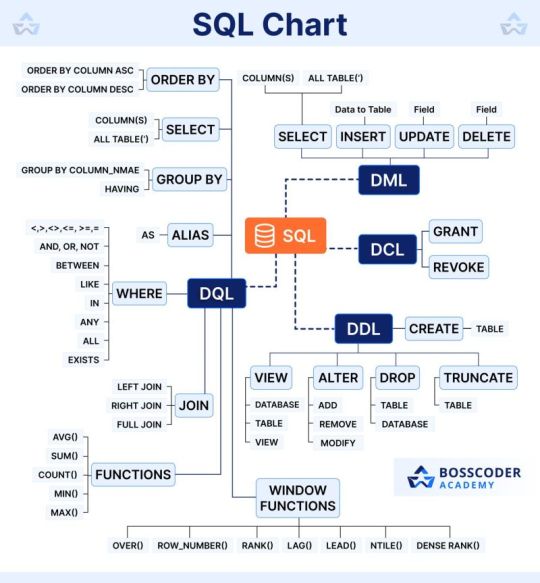
#software development#web development#100daysofcode#developerlife#web developers#developers#devs#worldcode#developers & startups#backenddevelopment#sql#programadores
5 notes
·
View notes
Text

today i tried to code more
#ik it looks very simple but im gonna make it look nice i swear!!#at least thats the plan lol#but im focusing on databases next to hold the different bfs that can be collected#run now if u dont wanna read a bunch of technical stuff....#main focus is on scary stuff until im confident i can have this site up and fuctional (tho ill draw here and there lol)#ive messed with and learned sql before but havent used it in any practical way#so setting this up is probably not going to be the fastest process#especially since ive never mixed images and databases before#im assuming u save the images to a folder and can just call them from there#every single bf on the site will have a unique id so that makes things much easier#tho i wanna make it so ppl can like decorate their bfs and stuff#dress them up and put backgrounds and items on them#so im wondering how you save those items on the bfs....#and it cant just be a screenshot cause the user should be able to access it again later and move stuff around#web development#anyways yea thats my update for today!#im kind of out of my realm but i dont care this is happening#i dont even care if 5 ppl r interested in this i just wanna succeed at making this whew#but yea i just want that kind of earlier website vibe#specifically like old neopets#or how cs looks right now#so im not gonna like get too overwhelmed!#im doing everything using html and css and js and php i think
5 notes
·
View notes
Text
That time I restored a Database view
Recently at work we've been migrating an old database system to a new platform to save money - this kind of shit is what makes your business processes faster, cheaper and more correct - and this has entailed sifting through a lot of tables, views, and views made of tables and views!
As it happens the finance guy who does all the payroll and expenses is a great guy to work with and basically the one person who knows all the relevant business rules, but also basically treats databases like they're excel workbooks. As such you have a bunch of bits stitched to each other and we're just figuring out how to first move everything and then ease into a well-oiled relational model with no duplication and all together on a single database.
While we in the dev team were figuring out how to do this for finance we were recently testing out a modified version of a view built on top of the old version and accidentally deleted the old version and not the modified testing version.
Mistakes are bound to happen, but we needed to figure out how to either restore it or at least figure out how to work without it because finance people love their data views and reports. There are probably clever things you can do with any DBMS to find shit you just dropped and restore it from backup, but I then realised that I'd been tasked with generating all the scripts for the database objects. There had to be a script laying around!
Sure enough I went to dig up the build script for the dropped view, and I ran it.
I queried it, and everything was back in place.
Shit goes wrong sometimes, but having the right failsafes can really make a difference.
Script your shit, use backups, use version control!
3 notes
·
View notes
Text
so it turns out they weren't kidding when they said breaking a monolith into microservices is hard.
#programming#enterprise software#enterprise application development#microservices#it also doesn't help that some folks need to BANNED from writing SQL queries
3 notes
·
View notes
Text
Making a compiler
Every programmer out there, new or experienced longs for a chance to create their own programming language and compiler. I am no exception. Months ago I decided to fork an old project on github and develop it in my image. The project was a golang-like unfinished compiler, so I dug in and made changes. I changed the language to resemble a subset of rust, go and ocaml. I plan to add a LLVM backend inspired by the tre golang compiler. I will continue working on it until it kinda works. I still have a lot to do. check out the project on the link below. If you want to contribute submit a pull request.
#golang#programming#rustlang#compiler#programming languages#c++#typescript#java#javascript#javaris x#java development company#javatpoint#software#developer#sql#open source#python
12 notes
·
View notes
Text
My 365 Days Streak at MIMO ...
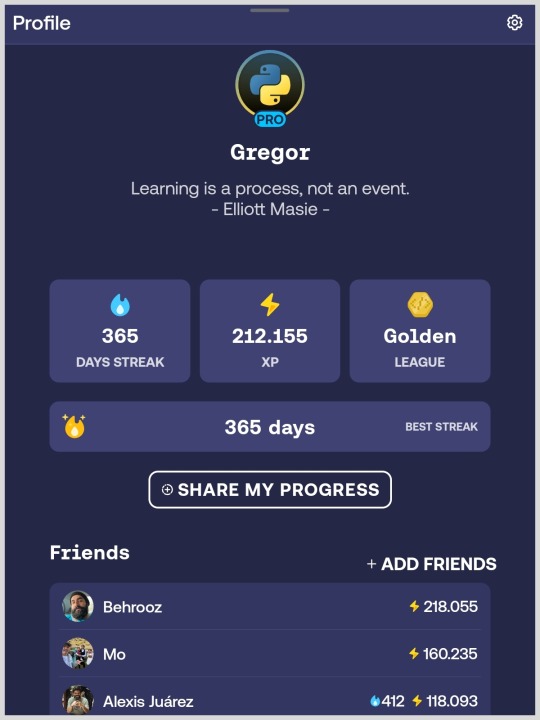
"At Mimo, we believe that coding can open doors to opportunities like few other skills. That's why we've rallied around the purpose of making coding accessible to as many people as possible." MIMO
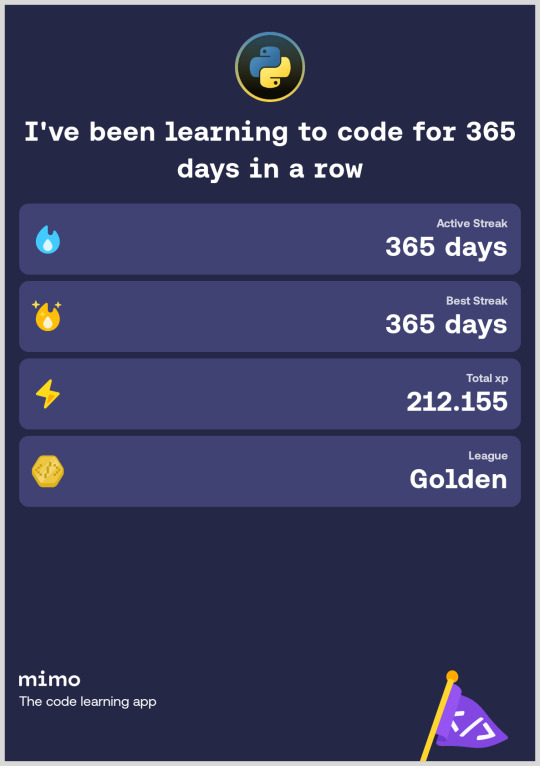
Today I completed my 365 day streak at Mimo. Phew, that was a long way through the programming and scripting languages “Python”, “SQL”, “HTML”, “CSS” and “JavaScript”.
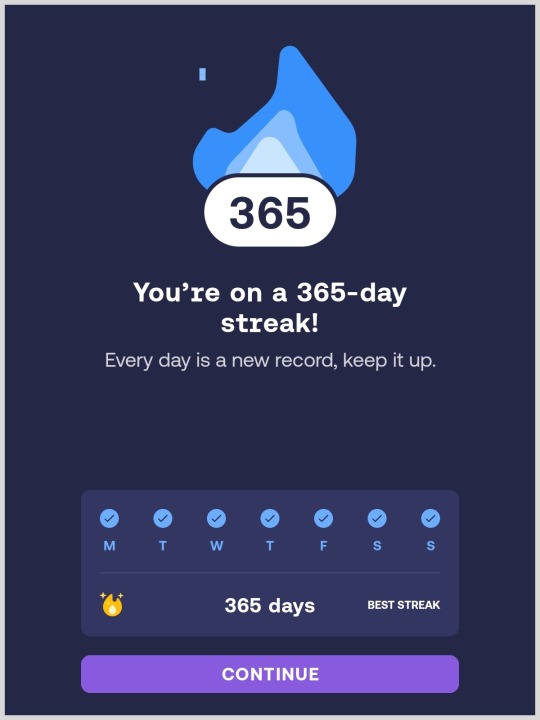
Even though there were sometimes tough times and I often repeated certain course sections, e.g. with "JavaScript", and the progress wasn't immediately apparent, I still enjoyed learning with MIMO again and again.
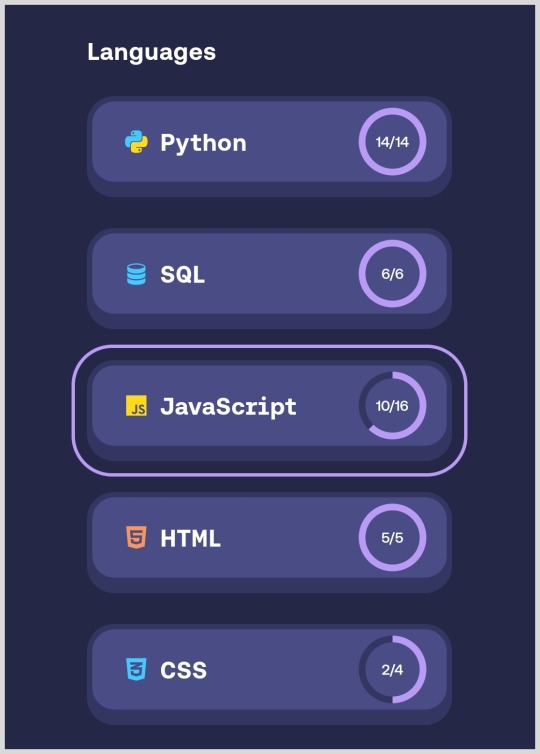
The support is also good, if you have questions or just get stuck. I can recommend MIMO to anyone who wants to immerse themselves in the world of programming languages online or with the app.
Post #209: Whoopee! My 365 Day streak on Mimo happens today on March 3, 2024.
#coding#programming#coding for kids#programmieren#education#javascript#css#sql#mimo#programming languages#html#teaching#learning#development#developer#developer community
6 notes
·
View notes
Text
How to Install Python on Windows 10
Python is a popular and versatile programming language that you can use for various purposes, such as web development, data analysis, machine learning, and more. In this tutorial, I will show you how to install Python on your Windows 10 computer in a few simple steps.
Step 1: Download the Python installer
You can download the latest version of Python from the official website: https://www.python.org/downloads/. Choose the Windows installer that matches your system architecture (32-bit or 64-bit).
Step 2: Run the Python installer
Once you have downloaded the Python installer, double-click on it to launch it. You will see a window like this:
Make sure to check the box that says “Add Python 3.x to PATH” to enable Python to run from any directory on your computer. Then, click on “Install Now” to start the installation process.
Step 3: Verify the Python installation
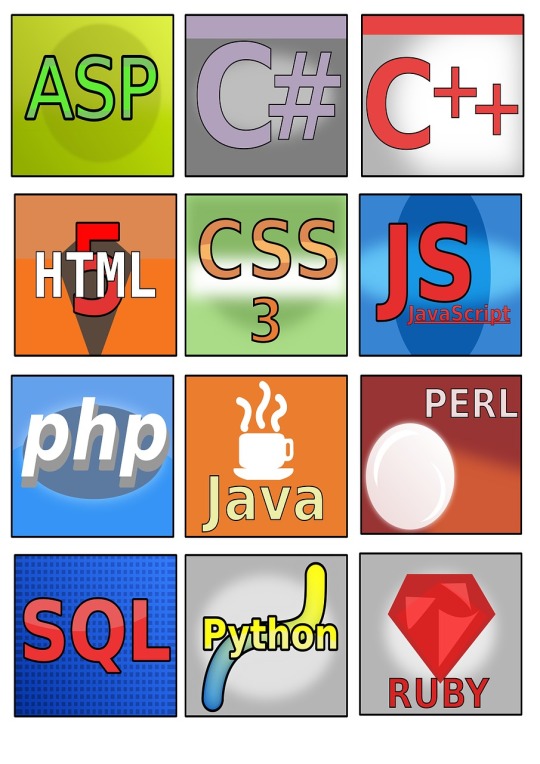
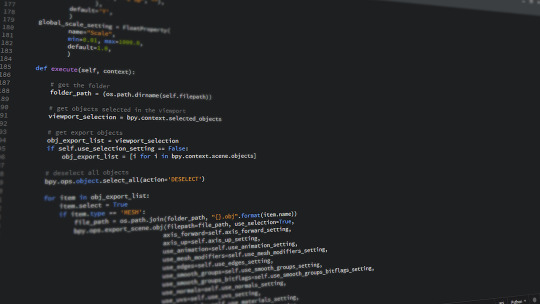
After the installation is complete, you can verify that Python is installed correctly by opening a command prompt and typing:
python --version
You should see the Python version that you installed, like this:
![Python version output]
Congratulations, you have successfully installed Python on your Windows 10 computer! 🎉
Don't forget to follow me @treasuremani
#pythonlearning#python language#software development#software#coding#programming#android app development#html#python#sql#php#css
2 notes
·
View notes
Text
SQL Fundamentals #2: SQL Data Manipulation
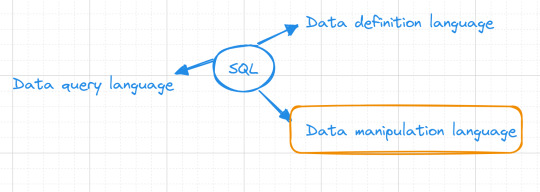
In our previous database exploration journey, SQL Fundamentals #1: SQL Data Definition, we set the stage by introducing the "books" table nestled within our bookstore database. Currently, our table is empty, Looking like :
books
| title | author | genre | publishedYear | price |
Data manipulation
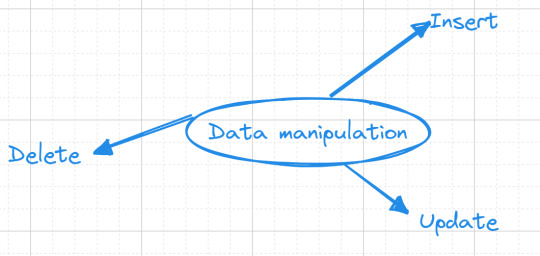
Now, let's embark on database interaction—data manipulation. This is where the magic happens, where our "books" table comes to life, and we finish our mission of data storage.
Inserting Data
Our initial task revolves around adding a collection of books into our "books" table. we want to add the book "The Great Gatsby" to our collection, authored F. Scott Fitzgerald. Here's how we express this in SQL:
INSERT INTO books(title, author, genre, publishedYear, price) VALUES('The Great Gatsby', 'F. Scott Fitzgerald', 'Classic', 1925, 10.99);
Alternatively, you can use a shorter form for inserting values, but be cautious as it relies on the order of columns in your table:
INSERT INTO books VALUES('The Great Gatsby', 'F. Scott Fitzgerald', 'Classic', 1925, 10.99);
Updating data
As time goes on, you might find the need to modify existing data in our "books" table. To accomplish this, we use the UPDATE command.For example :
UPDATE books SET price = 12.99 WHERE title = 'The Great Gatsby';
This SQL statement will locate the row with the title "The Great Gatsby" and modify its price to $12.99.
We'll discuss the where clause in (SQL fundamentals #3)
Deleting data
Sometimes, data becomes obsolete or irrelevant, and it's essential to remove it from our table. The DELETE FROM command allows us to delete entire rows from our table.For example :
DELETE FROM books WHERE title = 'Moby-Dick';
This SQL statement will find the row with the title "Moby-Dick" and remove it entirely from your "books" table.
To maintain a reader-friendly and approachable tone, I'll save the discussion on the third part of SQL, which focuses on data querying, for the upcoming post. Stay tuned ...
#studyblr#code#codeblr#javascript#java development company#study#progblr#programming#studying#comp sci#web design#web developers#web development#website design#webdev#website#tech#sql#sql course#mysql#datascience#data#backend
43 notes
·
View notes
Text
everypony i am on the absolute most hellish meeting with the nicest colleague in the world. it is a TWO PART MEETING that has already taken an hour and a half. we had to break bc we were both unravelling i think. siri play untitled by simple plan.
#this is not my colleagues fault ftr its the fault of our Evil Database which seems to have been developed based on fae logic#how could this happen to me etc etc#it seems i must learn sql which is very sexy and all bc i love databases but also i don’t want to do it#everyone stay tuned for the au that’s just L falling in love with light bc he has god tier database skills#i am not joking. this is not a joke.
6 notes
·
View notes
Text
2 notes
·
View notes
Text
TIOBE Index for May 2023 - Which Programming Language is Most Popular?
Have you seen the latest TIOBE rankings report? The TIOBE Programming Community index is an indicator of the popularity of programming languages. The index is updated once a month. The ratings are based on the number of skilled engineers world-wide, courses and third-party vendors. Popular search engines such as Google, Bing, Yahoo!, Wikipedia, Amazon, YouTube and Baidu are used to calculate the…

View On WordPress
#Assembly#Coding#Java#JavaScript#Lua#PHP#Programming#Python#Software Development#SQL#Swift#TIOBE#Visual Basic
2 notes
·
View notes